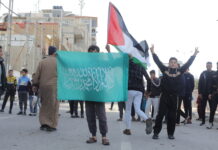It appears that the United States and its Western allies (France and the United Kingdom) have agreed to Turkish President Receb Tayyip Erdogan’s demand for a buffer zone on the Syrian side of the lengthy Turkish-Syrian border as a pre-condition for Turkey’s involvement in the fight against Islamic State (IS), writes Abdel Bari Atwan.
The Pentagon admitted today that US airstrikes alone would not be sufficient to save Kobane, paving the way for ground forces to confront IS and stop its advance into the city, and drive it back from the areas inside Kobane that it as already captured, raising its black flag on buildings.
No one other than the Turkish Army, the world’s seventh largest army, can do this job.
President Erdogan, who is currently facing tough choices in Syria and Iraq, presented three main demands as pre-conditions to joining the war against IS:
1. Establish a buffer zone on Syrian territory adjacent to the Turkish border. As these are Kurdish areas, the creation of a buffer zone would put a final end to the Syrian Kurds’ dream of independence or self-rule. It would also prevent the Kurdistan Workers Party [PKK] from using these regions as a staging point for operations inside Turkey.
2. Enforce no-fly zones north and west of Syria, similar to those that were imposed in Iraq and Libya. This would paralyse the Syrian Air Force and lay the foundations for an independent Syrian pocket run by the opposition.
3. Conduct intensive training for the “moderate” Syrian opposition and supply it with lethal weapons.
Subscribe to our newsletter and stay updated on the latest news and updates from around the Muslim world!
Assad
President Erdogan wants to topple the Syrian regime first, or at the very least be assured that the war will simultaneously target the Assad regime and IS. His personal integrity is jeopardized if Assad is not removed from power since he swore two years ago that his regional rival must fall.
The US Administration meanwhile has its own concerns, coming under much criticism over its inefficient airstrikes, and it does not want to lose the mid-term election next month. This is why US Secretary of State John Kerry and his British counterpart Philip Hammond said that their countries are “ready” to discuss the idea of creating a buffer zone on the border between Turkey and Syria.

The acceptance of Erdogan’s conditions by the United States and its allies is tantamount to a declaration of war on Syria, as the regime in Damascus and its Iranian allies, and perhaps the Russians too, see it.
The regime has remained silent so far on US airstrikes that constitute a violation of Syrian sovereignty; it would find it more difficult to remain silent on the establishment of buffer zones on Syrian territory and no-fly zones in Syrian airspace.
This explains Iranian Foreign Ministry Spokeswoman Marzia Afkham’s assertion that Iran is ready to provide the necessary support for Kobani if the Syrian authorities ask for it because Kobani is part of the Syrian territory and national sovereignty.
Iranian manouevres
Syrian-Iranian attitudes were reflected in two important steps that the two countries took in the past three weeks:
The first was the visit to Assad in Damascus by General Qassim Suleimani, Iran’s strongman and commander of Qods Brigade. The visit coincided with reports that Iran had transferred missiles and mortar bombs to pro-Iran militias fighting alongside the Syrian regime’s forces against the armed opposition groups and had also deployed drones and 2,000 Iranian Revolutionary Guard elements in Syria.

The second was the bombing of an Israeli patrol in the occupied Shab’a Farms in south Lebanon and Hezbollah’s claim of responsibility. The bombing, which followed years of calm on that front, was a message to Israel, the United States, and all the Western countries that Iran will respond to any attempt to bring down the Syrian regime not only by fighting the party that makes this attempt but also by opening a war on Israel and firing thousands of missiles on its cities and settlements, and even by liberating areas in the occupied Upper Galilee.
President Obama’s administration, which for more than three years has been careful not to fall into the trap of military intervention in Syria, is now faced with choices as difficult as those facing its Turkish ally, which is strongly pushing Washington to abandon its caution and hesitation and to respond favourably to Ankara’s efforts to overthrow the Syrian regime first.
If it wishes, and with a green light from Iran, Hezbollah, as an expression of solidarity with its ally in Damascus, can ignite this war and fire tens of thousands of missiles on Tel Aviv and beyond Tel Aviv. The Shia party knows very well that the fall of the Syrian regime means its own fall and the closure of the vital Iranian pipeline that supplies it with weapons and money, and with it the entire opposition order, as the party calls it.
The war on IS will gradually transform into a war against the Syrian regime. The fall of Kobane would see the eruption of the Kurdish bomb in President Erdogan’s face and the return of his army to bloody confrontations inside as well as outside his national borders.
The entire Middle East is witnessing a radical change that will probably spare no one. Regimes will fall and others will rise, and borders will change.
We are still at the beginning of the road, or near the first station, and no one knows where the final destination will be nor how or when we will reach it. The detonator is IS and the password is Kobane.






















